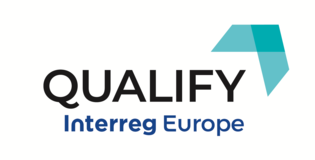The fourth meeting of the Strategic Committee of the Interreg Europe QUALIFY project took place on 26 January 2022. It was held jointly with the Autonomous University of Barcelona (UAB), through the InnoHEIs project, which seeks to promote university-business collaboration to strengthen university resources and infrastructure, and which sees the agri-food sector as a key area.
This meeting aimed to share an initial proposal for the QUALIFY project Action Plan, led by the Ministry of Climate Action, Food and Rural Agenda. The Action Plan is the result of more than two years' work, and will include the initiatives to be carried out, framed within the Strategic Food Plan for Catalonia (PEAC) 2021-2026. More than 50 representatives of companies, agri-food sector professionals, research centres, universities, producers' associations and government took part in the meeting and have contributed ideas and suggestions for the Action Plan, which will include actions to improve the competitiveness of SMEs in the agri-food sector in the areas of the project: prevention of food fraud, quality self-monitoring and promotion of product authenticity and funding.
The session began with institutional greetings from the Director-General for Food, Quality and Agri-food Industries, Joan Gòdia, and the Vice-Rector for Innovation and Strategic Projects of the Autonomous University of Barcelona, Dr Rosa Maria Sebastián.
Next, the Deputy Director-General for Food Inspection and Control, Glòria Cugat, made a brief introduction to the first proposal of the Action Plan and thanked those attending the meeting for their presence and collaboration.
Ignasi Rodríguez, head of External Relations of the Ministry of Climate Action, Food and Rural Agenda, gave a presentation on “European funds and public-private collaboration. The case of agri-food”.
Guillermo Villuendas Huarte, head of the Innovation and Promotion of the Digital Sector Area of the Ministry of the Vice Presidency, Digital Policies and Territory, has presented “Disruptive or innovative technologies and the impact on the agri-food sector”.
Subsequently, Maria Rosa Biel and Eva Gomar, inspectors of the Subdirectorate General for Food Inspection and Control, led a presentation and debate session on the initial proposals of the QUALIFY Action Plan, which will have two central areas: information and networks and innovation and digitisation.
The day ended with a discussion-work session under the challenge “Taking advantage of the resources and infrastructure of universities to develop projects for innovation and technology transfer to the agri-food sector”, led by Elisabetta Marinelli, Policy Research Interface (representing the UAB), in which the participants made contributions on issues related to the QUALIFY and InnoHEIs projects, particularly on how to strengthen university-business collaboration in the agri-food sphere.
Throughout the day and the debate sessions proposals and observations on collaboration between research centres, the government and companies and regarding the needs and opportunities of digital technologies were gathered, and success stories presented, along with aspects of collaboration and financing where there is still room for improvement.
The initial conclusions were summarised by Deputy Director-General Cugat, and the Committee members were invited to continue making contributions until the end of February.
Networking, sharing experiences and multidisciplinary visions made the Strategic Committee meeting very useful, as always. It made it possible to collect ideas that will surely help to improve and specify the QUALIFY Action Plan so that it provides impetus for improving the competitiveness of Catalan agri-food SMEs.




